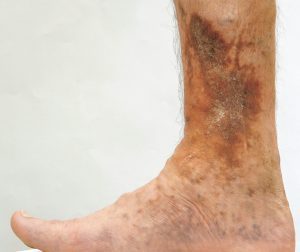By Bryan Carter, MPA-C, Phlebology-Surgery
 If you’ve noticed that your legs, ankles, or feet are beginning to look darker, show redness or small dots that resemble a rash, you will want to seek out medical diagnosis and treatment as soon as possible. These symptoms are often associated with cardiovascular disease.
If you’ve noticed that your legs, ankles, or feet are beginning to look darker, show redness or small dots that resemble a rash, you will want to seek out medical diagnosis and treatment as soon as possible. These symptoms are often associated with cardiovascular disease.
If you have PAD, venous, or arterial disease and suffer with pain and swelling, and now, have noticed skin darkening, your disease may be progressing and it’s wise to not ignore these symptoms, as early treatment can save you from amputation or more involved procedures. Skin discoloration can be a sign of disease progression.
With vascular disease, blood often pools into the lower extremities. The loss of oxygen-rich blood can make the skin take on a bluish or black appearance. When the blood flow is restricted or damaged, smaller blood vessels can break open, which stains the skin with brownish, iron deposits.
When the skin is depleted from blood flow, it usually becomes itchy, dry and is easily injured. We often, see patients with slow or non-healing wounds, which is a warning indicator of advanced vascular disease.
The skin will need to be addressed along with the underlying disease. The skin must be well cleansed, moisturized, and carefully maintained.
Peripheral Angiograms
An angiogram is a test used to diagnose problems with arteries and veins. Many people are familiar with a coronary angiogram, a test that focuses on the blood vessels feeding the heart. In a peripheral angiogram, a doctor checks for problems in one or more of the arteries that supply blood to the legs. An angiogram uses real-time image guidance (fluoroscopy) and provides detailed information to aid in planning the best treatment.
There are several lifestyle changes and treatments options available for arterial and venous disorders.
These can include the following:
. Dietary changes
. Exercise
. Elevating legs
. Eliminated habits like smoking or excessive alcohol consumption
. Compression stockings
. Atherectomy
. Angioplasty
. Stents
. And more aggressive surgical procedures
Don’t Ignore Your Symptoms!
If you have leg, foot and ankle swelling, this could potentially be a sign of a significant heart or peripheral vascular condition.
At Village Heart & Vein Center, Bryan Carter specializes in venous issues and leg health, taking great pride in getting to know his patients on an individual level. He is supported by a full-service cardiology practice. Mr. Carter is a previous Army combat medic who obtained his Masters in Physician Assistant studies with a thesis in Venous Disease and Treatment. Mr. Carter has been treating vein problems since October 2002 and was one of the first Physician Assistants to perform thermal ablation—a treatment that soon made traditional vein stripping extinct. Bryan has personally trained physicians, physician assistants and nurse practitioners throughout Florida and Georgia and is an active member of the American College of Phlebology. He is also one of only a few to be inducted into the American Venous Forum.
To find out more, please visit their website at villageheartandvein.com, or call their office to schedule your appointment at, (352) 674-2080.
Bryan Carter, MPA-C
Toll Free: 1-855-432-7848 (Heart 4 U)
 Central Florida Health and Wellness Magazine Health and Wellness Articles of the Villages
Central Florida Health and Wellness Magazine Health and Wellness Articles of the Villages



